Asian Sisters’ Gathering in Kansai
Korean, Taiwanese and Japanese Asian Sisters’ Gathering in Kansai─Feeling the Energy of Cooperatives across Borders
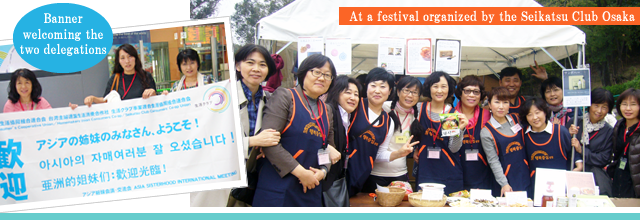
The Seikatsu Club Consumers' Cooperative Union (SCCCU) has been interacting with the Happy Consumer's Coop (formally called the Women Link Consumers' Co-op) in Korea and the Homemakers Union Consumers Co-op in Taiwan through the SCCCU Women’s Committee since they formed sister cooperative agreements in 1999. Two delegations, each consisting of 13 members, producers and staff members from Korea and Taiwan, visited Japan from November 2nd to 4th, the "Asian Sisters’ Gathering" being held in Kansai, western Japan. (Posted on November 27)
SCCCU, the Happy Consumer's Coop and the Homemakers Union Consumers Co-op have held an Annual Asian Sisters’ Meeting to discuss one of the cooperative principles every year from 2000 to 2010. In 2010, it was decided to alternate meetings (which focus more on discussion) and gatherings every other year, and thus SCCCU hosted a gathering in Kansai in 2013.
Since the autumn of 2012, when member cooperatives of SCCCU in Kansai decided to host the gathering, Chairpersons of the Board of Directors of six member cooperatives in the region (Seikatsu Club Osaka, Kyoto, Shiga, S Coop Osaka, Toshiseikatsu, Nara) met repeatedly with the chairperson and vice chairperson of the SCCCU Women's Committee and staff members of SCCCU to work with the Women’s Committee to organize the gathering.
Welcomed by Meals Prepared with Seikatsu Club's Consumer Materials
As the delegations from Korea and Taiwan arrived at Kansai International Airport on November 2nd, the first day of three consecutive holidays, the Japanese hosts were worrying about inclement weather for the gathering.
First of all, the delegations visited "Social Court Kobe Kita," an apartment facility for senior citizens run by an NPO, the Toshiseikatsu Community Center. After a presentation by the manager of the center, Mr. Keiichi Ikeda, the visitors appeared to be very interested in the facility and asked specific questions about management and user fees.
Members of the Women's Committee and Seikatsu Clubs in Kansai prepared a welcome party at the Japanese restaurant Sakura at Kobe University Consumers' Cooperative. The cooperative kindly agreed to prepare the meals using Seikatsu Club's consumer materials such as meat, tofu and fruit. The delegations looked very satisfied with the very inventively-prepared meal.
Time passed very rapidly as everyone enjoyed talking to each other and listening to welcoming speeches and the introductions of the participants through interpretation in the three languages.
A volunteer group consisting of members of the Toshiseikatsu played the Japanese folk musical instrument Naruko, which was originally designed to make noises to scare birds away. The group was formed after the Kobe earthquake in 1995. They work on music therapy at places like nursing homes for senior citizens. Toward the end of their performance, everybody played the Naruko and enjoyed singing Soranbushi, a Japanese folk song.
In the bus on way to the hotel, the visitors made teruteru bozu (paper dolls to which Japanese children pray for fine weather), thus experiencing a Japanese tradition. Dolls with different faces were hung from the handrails, which made everyone smile.

The Delegations Enjoy a Coop Festival Organized by the Seikatsu Club Osaka
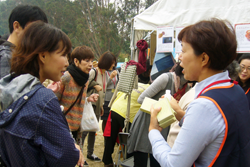 On the next day, the delegations joined the 34th Coop Festival, organized by the Seikatsu Club Osaka. The Sisters’ Gathering had its own booth and gave samples of seaweed, sweets and cosmetics from Korea and dry fruits from Taiwan to the festival participants. While giving the samples, they were accompanied by members of the Women's Committee to enjoy sampling the food at different booths and talking to local people. The visitors enjoyed the atmosphere of the festival, which was open to local residents. The festival was planned to be eco-friendly, and everyone seemed to be impressed by the reuse of dishes through a deposit system.
On the next day, the delegations joined the 34th Coop Festival, organized by the Seikatsu Club Osaka. The Sisters’ Gathering had its own booth and gave samples of seaweed, sweets and cosmetics from Korea and dry fruits from Taiwan to the festival participants. While giving the samples, they were accompanied by members of the Women's Committee to enjoy sampling the food at different booths and talking to local people. The visitors enjoyed the atmosphere of the festival, which was open to local residents. The festival was planned to be eco-friendly, and everyone seemed to be impressed by the reuse of dishes through a deposit system.
Report on Shared Challenges in the Three Countries. Basic Cooperative Law, Improving Self-Sufficiency in Wheat, and Support for Fukushima
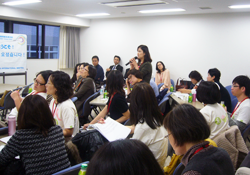 In the afternoon, the delegations moved to a conference room in the Kansai University Coop for presentations. As one of the hosts, Ms. Mayumi Shinoda (board member of SCCCU, Chairperson of the Board of Directors, Seikatsu Club Gunma) gave a presentation about the SCCCU Women's Committee. Then the visitors shared information on activities regarding common concerns, as they had promised to do at the previous Sisters Meeting.
In the afternoon, the delegations moved to a conference room in the Kansai University Coop for presentations. As one of the hosts, Ms. Mayumi Shinoda (board member of SCCCU, Chairperson of the Board of Directors, Seikatsu Club Gunma) gave a presentation about the SCCCU Women's Committee. Then the visitors shared information on activities regarding common concerns, as they had promised to do at the previous Sisters Meeting.
 Ms. Park Jong Ah (Chairperson of the Board of Directors, Goyang-Paju Happy Consumer's Coop) gave a presentation entitled "One Year after the Basic Cooperative Law: The current situation and challenges." More than 2000 cooperatives have been launched in Korea since the Basic Cooperative Law was enacted in December 2012. The situation can be described as a cooperative boom. The Happy Consumer’s Coop also encourages and educates its members on starting new cooperatives in the areas of catering and sewing.
Ms. Park Jong Ah (Chairperson of the Board of Directors, Goyang-Paju Happy Consumer's Coop) gave a presentation entitled "One Year after the Basic Cooperative Law: The current situation and challenges." More than 2000 cooperatives have been launched in Korea since the Basic Cooperative Law was enacted in December 2012. The situation can be described as a cooperative boom. The Happy Consumer’s Coop also encourages and educates its members on starting new cooperatives in the areas of catering and sewing.
Ms. Liu, Chieh-Feng (Director, Homemakers Union Consumers Co-op) gave a speech entitled “Members’ Participation Aiming at Improving the Self-Sufficiency Rate in Wheat -- Endeavor for 0.1%." While self-sufficiency rates in wheat and soy beans are almost 0% (less than 0.1%) their cooperative supports domestic farmers who have started to grow wheat on contract with the Co-op. The organization is also developing products using domestically-grown wheat, and is encouraging farmers to grow wheat and soy beans in rotation. "These are alternatives to the market economy," explained Ms. Liu.
As Japanese host, Ms. Tsuneko Kimura (Chairperson of the Board of Directors, Seikatsu Club Chiba) gave a presentation entitled "Fukushima after the Nuclear Disaster: Seikatsu Club's Support Activities," and talked about refreshment tours for children in Fukushima and an activity to check children’s thyroid glands. Questions were asked about the SCCCU's standards on radioactivity levels for products such as fish, the detection system used, and so on. Such questions reflected global concern over the contamination of the sea by radioactive substances.
After the presentations, the whole group travelled to Umeda in downtown Osaka for dinner. The visitors enjoyed talking through volunteer interpreters over Japanese food and looked much more relaxed than on the previous day.
Gathering in Kansai—Cooperative Energy across Borders
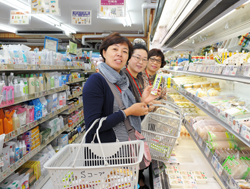 On the final day, the past three days were reviewed and discussion turned to the next Asia Sisters’ Meeting in Taiwan in 2014. The host of the upcoming gathering in Taiwan introduced their draft plans for the meeting and expressed an expectation to share experiences in organizing cooperatives. SCCCU proposed that the Taiwanese visitors continue their work on the concept of self-sufficiency in FEC (Food, Energy and Care). In addition, as two producers for SCCCU and three producers for the Korean consumers coop participated in the gathering, many participants expressed hopes for a deepening of relationships between producers across borders.
On the final day, the past three days were reviewed and discussion turned to the next Asia Sisters’ Meeting in Taiwan in 2014. The host of the upcoming gathering in Taiwan introduced their draft plans for the meeting and expressed an expectation to share experiences in organizing cooperatives. SCCCU proposed that the Taiwanese visitors continue their work on the concept of self-sufficiency in FEC (Food, Energy and Care). In addition, as two producers for SCCCU and three producers for the Korean consumers coop participated in the gathering, many participants expressed hopes for a deepening of relationships between producers across borders.
After the discussion, the delegations enjoyed a boxed lunch prepared by a workers collective, Tsumugiya, and then returned to their countries after shopping at Shiroyamadai Do, one of the S Coop Osaka stores.
Organized with the full cooperation of the Seikatsu Clubs in Kansai, in spite of the limited time of three days the gathering was an important opportunity to feel the energy and presence of cooperatives unique to Kansai. It was an excellent example of cooperation among cooperatives, especially as Kobe University Coop and Kansai University Coop were supportive in offering venues and other assistance.
In the face of an expanding market economy under FTAs and TPP, it is becoming more and more important for consumers’ cooperatives in Eastern Asia to learn from each other on issues including food safety, food self-sufficiency, environmental protection, the phasing out of nuclear power generation, and measures to tackle the aging population. The sister cooperatives will continue to deepen their partnership that has been built up over the past 15 years.
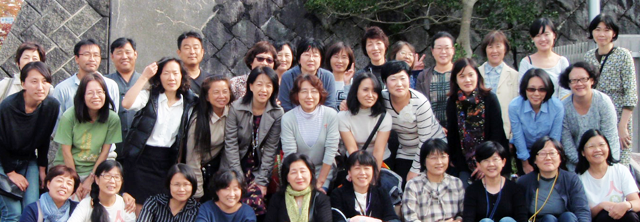
生活クラブをはじめませんか?
42万人が選ぶ安心食材の宅配生協です
ウェブ加入限定 無料プレゼント






